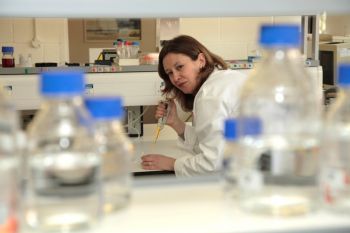Broadcast: News items
Sir Terry Pratchett and Alzheimer's research at Sussex
By: James Hakner
Last updated: Wednesday, 3 February 2010

Biochemist Louise Serpell at work in her lab at University of Sussex
Research into dementia is the Cinderella of causes when it comes to funding for basic research, says the Alzheimer's Research Trust (ART), which is already backing work on Alzheimer's disease at the University of Sussex.
According to findings in an ART report, for every one pound spent on dementia research, 12 times that sum goes on investigating cancer. As the number of dementia cases continues to rise (there are 821,884 sufferers currently in the UK), more research such as the project being conducted by Dr Louise Serpell, needs to be underwritten in the battle to discover the causes and potential cures.
Dr Serpell is based at Sussex and leads a collaborative research team working with the VIB and Free University of Brussels in Belgium and the National Institute for Medical Research in London.
The team has been investigating ways of slowing or halting the progress of Alzheimer's in the brain. The work was funded in 2008 through a US $1 million donation from author Sir Terry Pratchett, who has been diagnosed with Alzheimer's and who is patron of ART.
Last year, on the first anniversary of the donation, the Sussex team reported back on progress so far. A wide variety of cutting-edge approaches have been employed to help them find out what happens as Alzheimer's develops.
The techniques are helping the team to understand how toxic particles in the brains of people with Alzheimer's form and begin to attack brain cells. With the aim of the research to gain detailed understanding of how Alzheimer's develops, the findings will be crucial in the development of new treatments that could combat the disease.
Dr Serpell says: "This research is vitally important for efforts to develop new treatments for Alzheimer's. We urgently need to improve our understanding of what happens in the brain as the disease develops. As our knowledge increases, we can target new research towards therapies that can help people with dementia."
Rebecca Wood, Chief Executive of the Alzheimer's Research Trust, said: "Dr Serpell's research at the University of Sussex is putting Sir Terry's funding to excellent use, and her study is already improving our understanding of how Alzheimer's develops, edging us ever closer to the treatments we so desperately need."
Sir Terry Pratchett, Patron of the Alzheimer's Research Trust, said: "There's only two ways it can go: researchers, with as much help we can give them, may come up with something that reduces the effects of this dreadful, inhuman disease, or we will have to face the consequences of our failure to prevent the final years of many of us being a long bad dream."

